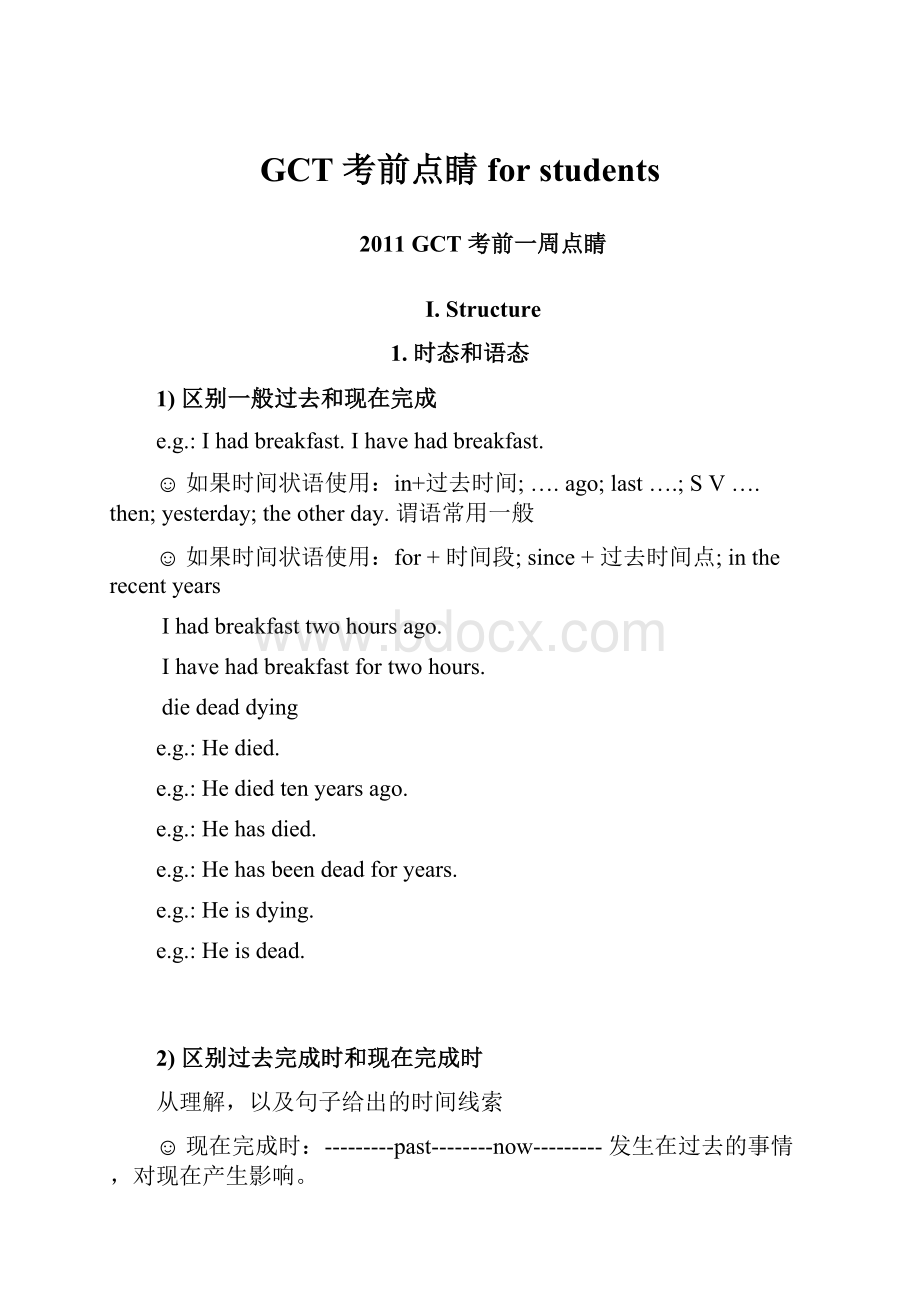GCT 考前点睛 for students.docx
《GCT 考前点睛 for students.docx》由会员分享,可在线阅读,更多相关《GCT 考前点睛 for students.docx(50页珍藏版)》请在冰豆网上搜索。

GCT考前点睛forstudents
2011GCT考前一周点睛
I.Structure
1.时态和语态
1)区别一般过去和现在完成
e.g.:
Ihadbreakfast.Ihavehadbreakfast.
☺如果时间状语使用:
in+过去时间;….ago;last….;SV….then;yesterday;theotherday.谓语常用一般
☺如果时间状语使用:
for+时间段;since+过去时间点;intherecentyears
Ihadbreakfasttwohoursago.
Ihavehadbreakfastfortwohours.
diedeaddying
e.g.:
Hedied.
e.g.:
Hediedtenyearsago.
e.g.:
Hehasdied.
e.g.:
Hehasbeendeadforyears.
e.g.:
Heisdying.
e.g.:
Heisdead.
2)区别过去完成时和现在完成时
从理解,以及句子给出的时间线索
☺现在完成时:
---------past--------now---------发生在过去的事情,对现在产生影响。
☺过去完成时:
-------pastofpast-------past--------now---------发生在过去的过去的事情,对过去产生影响
e.g.:
Ihadhardlyfallenasleepwhenthetelephonerang.
e.g.:
Theoldmanhaslivedintheoldhousesincehiswifewasgone.
3)过去将来时:
发生在过去一点的将来
Shesaidthatshewoulddothat.
4)非谓语动词的被动
Themethodenablescertainexperimentstobedoneintesttubeswithoutanimals-using.
2.非谓语动词
1)V+todo/doing….的区别
☺todo作动词的宾语
a.通常接todo作宾语的动词:
agree,decide,desire,determine,expect,hope,pretend,promise,refuse,wish….
☺b.通常接doing作宾语的动词和短语:
admit,appreciate,avoid,consider,delay,dislike,enjoy,escape,finish,imagine,keep,mind,miss,practise,risk,resist,suggest....
beusedto,can'thelp,can'tsand,giveup,goon,feellike,lookforwardto,devoteto,stickto,objectto,bebusy....
☺doing与todo的区别:
love,like,hate
+todo表示具体行为e.g.:
Iliketogoswimmingthisweekend.
+doing表示经常性的行为e.g.:
Ilikeswimming.
start,begin,continue
书面语中接doing,口头语中接todo,区别不明显,多根据使用者的语言习惯而定
e.g.:
Hecontinuedtowalk/walking.
下列三种情况接todo:
*当主语为物时:
e.g.:
Itstartstorain.要下雨了.
*以-ing形式出现时:
e.g.:
Sheisbeginningtocookdinner.
*当后面的宾语表示情感,思维,意念等e.g.:
Hebegantorealizehismistakes.
forget,remember,regret
+todo没有做的事情+doing做过的事情
e.g.:
Don’tforgettoturnoffthelights
Iforgottoreturningyourmoney.
e.g.:
Iregrettoinformyouthat….
Iregretseeingthefilm.
try,attempt
+todo努力/试图做某事或者表示还未行动
+doing尝试着做某事(不行不会坚持)或者表示已经行动
e.g.:
Itriedtobreakupthedeadlock.Hetriedmovingthetable.
e.g.:
Rosetriedtokillherself.Rosetriedkillingherself.
mean
+todo意欲/想/企图+doing意味着
e.g.:
Imeanttogiveyouthisbooktoday,butIforgot.
e.g.:
Doingwithoutapetandsendingthemoneytorelieforganizationmeanssavingalife.
gooncontinue
+todo继续做刚刚停在的事情/做完一件事情,继续做另一件事情
+doing继续做同一件事情
e.g.:
stop
+todo停下(正在做的)某事,去做某事
+doing停下正在做的事情
need,require,want
+todo主动
+doing被动
e.g.:
Radiostodayseldomneedrepairingortheattentionofatechnician.
Radiostodayseldomneedtoberepairedortheattentionofatechnician.
2)分词短语做状语,以及独立主格结构
☺分词短语做状语
Whenhehadlunch,Jacksneezed.
Whenhehadlunch,Jacksneezed
主动关系,用现在分词表示
[Havinglunch],Jacksneezed.
Seenfromthehighbuilding,peoplelooklikeants.
☺独立主格结构
如果有自己独立的逻辑主语,直接加在分词短语前
Rosehavinglunch,Jacksneezed.
独立主格结构的形式:
A型和B型
A型:
1.逻辑主语+现在分词,SV
[Rosehavinglunch],Jacksneezed
2.逻辑主语+过去分词,SV
Theproblemsolved,everybodywastired.
3.逻辑主语+不定式,SV
Thequestiontobediscussedonthemeeting,Ihavetoprepareit
4.逻辑主语+形容词,SV
Momill,Ihavetocareforher.
5.逻辑主语+副词,SV
Timeup,let’sgo.
6.逻辑主语+介词短语,SV
Swordinhand,Iamafraidofnothing.
独立主格结构的形式:
B型:
With+A
3)形式主语it代替真正的主语todo
☺Itis+adj.+todo….
☺Itis+adj.forsb.Todosth….
☺Itis+adj.thatsb.dosth…
e.g.:
Itisagreatpityfortheretobeanyquarrelintheschoolboardmeeting.
=Itisagreatpitythattherewasanyquarrelintheschoolboardmeeting.
3.从句引导词
名词从句引导词:
that,whether,if;who,whom,whose,what,which,when,where,why,how,howmany….
定语从句引导词:
that,which,who,whom,whose,prep.+which/whom,when,where,why,as….
状语从句引导词:
时间when,whenever,as,while,after,before,since,not….until,till,assoonas,hardly….when….,nosooner….than….,everytime
地点where,wherever
条件if,unless,provided,supposing,aslongas,once,incase
原因because,since,as,inthat,nowthat
目的sothat,inorderthat,lest
结果sothat,so+adj./adv.+that,such+n.+that
比较as+adj/adv.+asSV….,adj./adv.er….thanSV….,theadj./adv.erSV,theadj./adv.er+SV.
方式as,asif,asthough
让步although,though,as,evenif,eventhough,however+adj/adv+SV,whatever+n.+SV
1)名词和代词后面的从句
1n./pron.+that/who/which/whom+残缺的句子
e.g.:
Isthereanythingelse_______youwanttogetreadyforthepartythisevening?
A.whichB.whoC.whatD.that
e.g.:
Thepeople____areopposedtoeuthanasiaaretellingmethatthedyingpeoplehavenorighttochoosewhattheywant.
A.whomB.whatC.whoD.which
②抽象n.+that+完整的句子
e.g.:
Noonecoulddenythefact____wearethepartofeco-system.
③时间n+when+完整句子
e.g.:
Doyourememberthetimewhenwefallinlove?
④时间n+that/which+残缺句子
e.g.:
Thetimethatwespendonapatdoesnotbelongtoourown.
⑤地点n+where+完整句子
e.g.:
Doyoustillrememberthelittleflatwhereweusedtolive?
⑥地点n+that/which+残缺句子
e.g.:
XXXthatmyhusbandandIvisitedlastmonthisareallywonderfuldreamland.
⑦n./pron.+prep.+which/whom
e.g.:
Thecircumstances__________peoplelivehaveaneffectontheirculturesandcustoms.
e.g.:
Ablackholeisaspaceregion__________nothingcanescape.
⑧n.+whosen.’
e.g.:
Iliketheroomwhosewindowfacesthesouth.
e.g.:
Peoplearesurprisedtotheteenagerswhosebehaviorsareoffensive.
2)及物动词和介词后面的从句
①vt./prep.+that/whether/if+完整的句子
That无意义;whether,if是否
e.g.:
Weknowthataparrotcan’treallyspeak.
②vt./prep.+what+残缺的句子
e.g.Idon'tcarewhatshethinks.
3)SV….,____sv….
①SV….,+which+残缺的句子
e.g.:
mypolicyhasalwaysbeennottoworrybuttostartplanningthenextexperiment,whichisalwaysfun.
②SV….,[状语从句引导词+完整句子]
JazzwasactuallyappreciatedasanimportantartforminEuropebeforeitgainedsuchrecognitionintheUnitedStates.
③SV….,[however+adj/advSV….]
SV….,[whatever+n.SV….]
e.g.:
Howeversmallthenewfindingmaybe,itisgreattothink“Iamtheonlypersonwhoknowsthis”
e.g.:
Whateverdifficultiesweareconfronted,wewillexertallofourstrength.
4)as/though引导让步状语从句的倒装
P+as/though+SV,SV….
e.g.:
Handsomeasheis,heknowsnothingabout
e.g.:
Childasheis,hecouldspeakfourlanguages.
4.倒装
1)表示否定或基本否定的词和词组放在句首作状语时
否定的副词:
notuntil,never,scarcely,hardly,rarely,little,nowhere,nosooner…than…,hardly…when,notonly…,innocase,innoway,onnoaccount,atnotime,under(in)nocircumstances.
e.g.:
Neverbeforehasanyoneappliedsuchprinciplestopractice.
Anyonehasappliedsuchprinciplestopracticeneverbefore.
e.g.:
NotonlywasChaplinadmiredasafirst-classactor,healsomadehisnameasafamousdirector.
Chaplinwasnotonlyadmiredasafirst-classactor,healsomadehisnameasafamousdirector.
e.g.:
Undernocircumstances,couldweaccepttheso-called“TaiwanIndependence”
Wecouldaccepttheso-called“TaiwanIndependence”,undernocircumstances.
e.g.:
Notuntilshewasdead,hadpeoplerememberedhermisfortunes
Peopledidn’trememberhermisfortunesuntilshewasdead.
2)only修饰的状语放在句首
[only……]V情动/be/V助动+S+…
e.g.:
Onlyinaharmoniousfamily,canachildbuilduphisself-esteem.
Onlywhenshecalmsdown,shewilllistentoyourexplanation.
3)句首为so,nor,neither等副词,表面前句说明的情况也适用于本句时
....so+be/have/助动词/情态动词+主语....也是一样
....nor/neither+be/have/助动词/情态动词+主语....也是一样
e.g.:
---Iwasafraid.---sowasI.
e.g.:
---Ican’tspeakEnglish.---norcanI.
e.g.:
---Arabbitisagentleanimal.---soitis.
※.nor/neither可以用not....either
比较:
Ihaveneverbeenabroad.Sohasn’the.
Ihaveneverbeenabroad.Neither/Norhashe.
Ihaveneverbeenabroad.Hehasnever/notbeenabroad,either.
4)虚拟语气中的倒装
倒装的是从句部分,从句中的谓语部分要出现助动词:
had,should,were,非真实条件从句中连词省略
e.g.:
IfIshouldfail,Iwouldtryagain.
ShouldIfail,Iwouldtryagain.
e.g.:
Ifyouhadtakenmyadvice,youwouldhavedownwell
5)as引导让步状语从句
[adj+as+SV],SV[V+as+S+V情态],SV
e.g.:
Handsomeasheis,hehasnogirl-friend.
6)so….that….的倒装
So+adj./adv.+be/have/助动词/情态动词+S+thatSV.
e.g.:
SoclearlydoeshespeakEnglishthathecanalwaysmakehimselfunderstood.
Exercises:
1.Notuntilactuallyfacedwithwaterscarcityappreciatethevalueofwatertoaregion.(08)
A.onecanB.onecannotC.canoneD.cannotone
2.OnlybyunderstandingtheWebdeeplyhopeforpeopletograspitsfullpotential.(06)
A.cantherebeB.canbethereC.betherecanD.therecanbe
3.Scarcelythosewordswhensuddenlythemonsterwastransformedintoaveryhandsomeyouth.(05)
A.hadheutteredB.didheutterC.hehadutteredD.hedidutter
4.Notuntilrecentyearsapopularmeansofcommunication.
A.e-mailbecameB.e-mailhasbecome
C.dide-mailbecomeD.wille-mailbecome
5.Beforewedepartedlastweekend,wewouldhavehadawonderfuldinnerparty.
A.HadtheyarrivedB.Wouldtheyarrive
C.WeretheyarrivingD.Weretheytoarrive
II.Vocabulary
[A]charge[A]指控
[B]curse[B]诅咒
[C]accuse[C]控告
[D]scold[D]责骂
[A]abandon[A]放弃
[B]desert[B]抛弃
[C]injure[C]伤害
[D]punish[D]惩罚
[A]damage[A]损害,伤害
[B]spoil[B]宠坏
[C]hurt[C]伤害
[D]harm[D]伤害
[A]sentence[A]判决
[B]tear[B]撕破
[C]wreck[C](船,飞机的)失事
[D]fatigue[D]疲劳
[A]release[A]释放
[B]relieve[B]使宽慰,减轻
[C]loosen[C]放松,松弛
[D]dismiss[D]解散,解雇,驳回
[A]grant[A]同意,准予
[B]entitle[B]授权,给...权利
[C]credit[C]相信,信任,信贷
[D]give[D]交给
[A]attraction[A]吸引力
[B]attention[B]注意
[C]arrangement[C]安排
[D]appointment[D]约会
[A]appoint[A]任命,委派
[B]order[B]整顿
[C]arrange[C]安排
[D]tidy[D